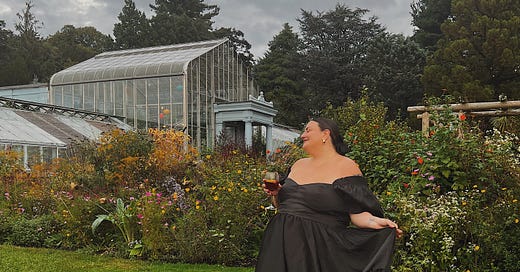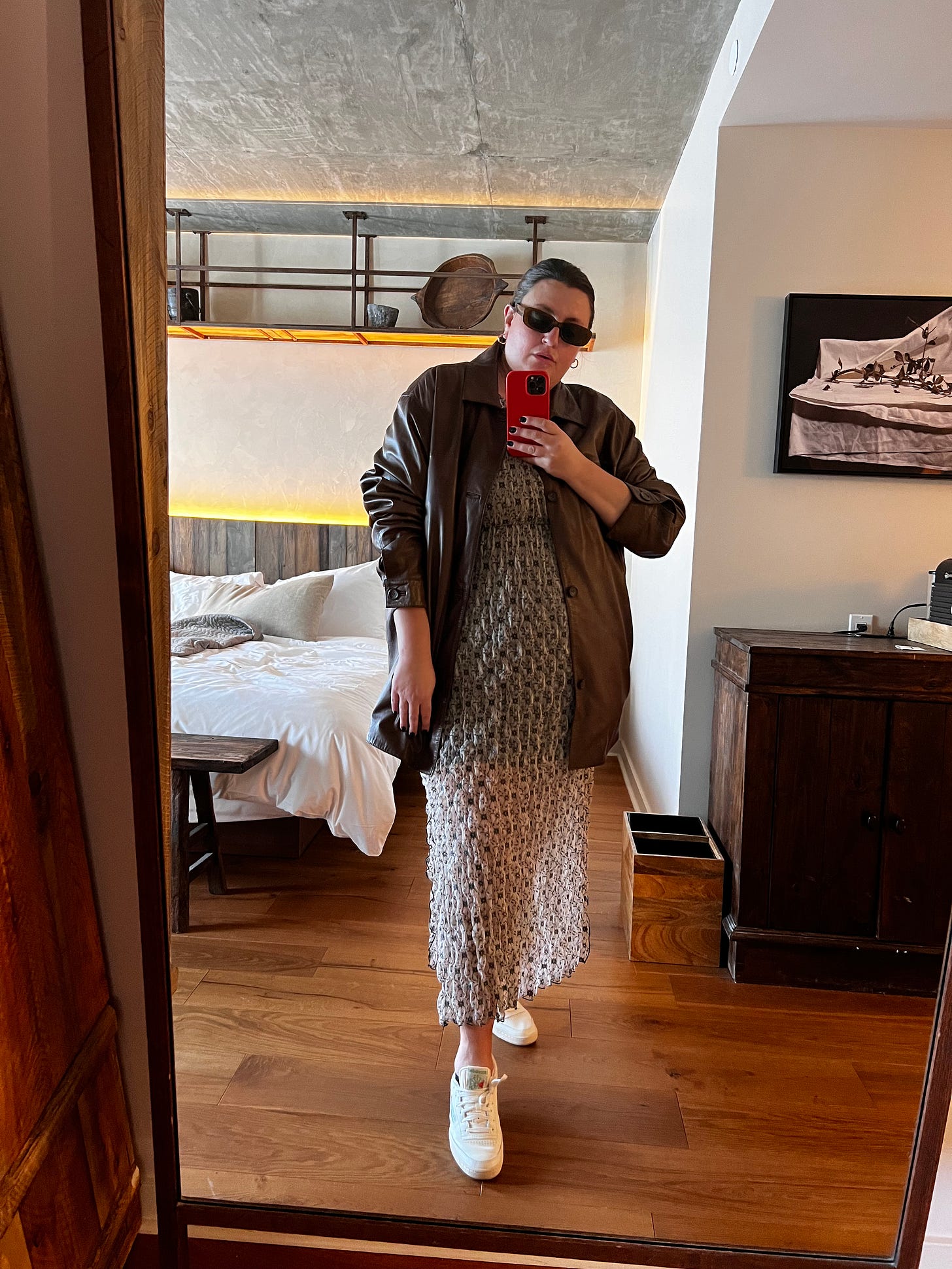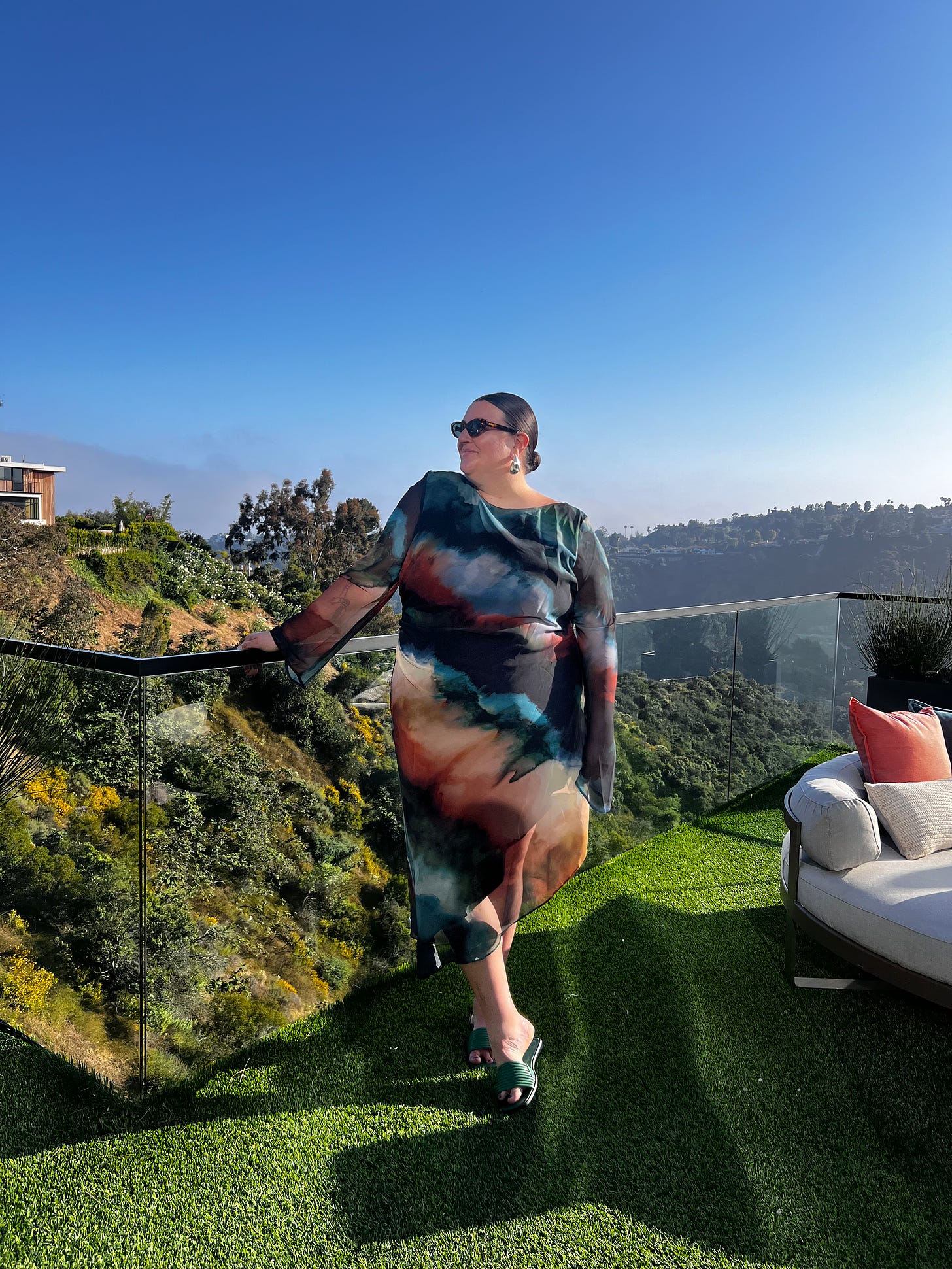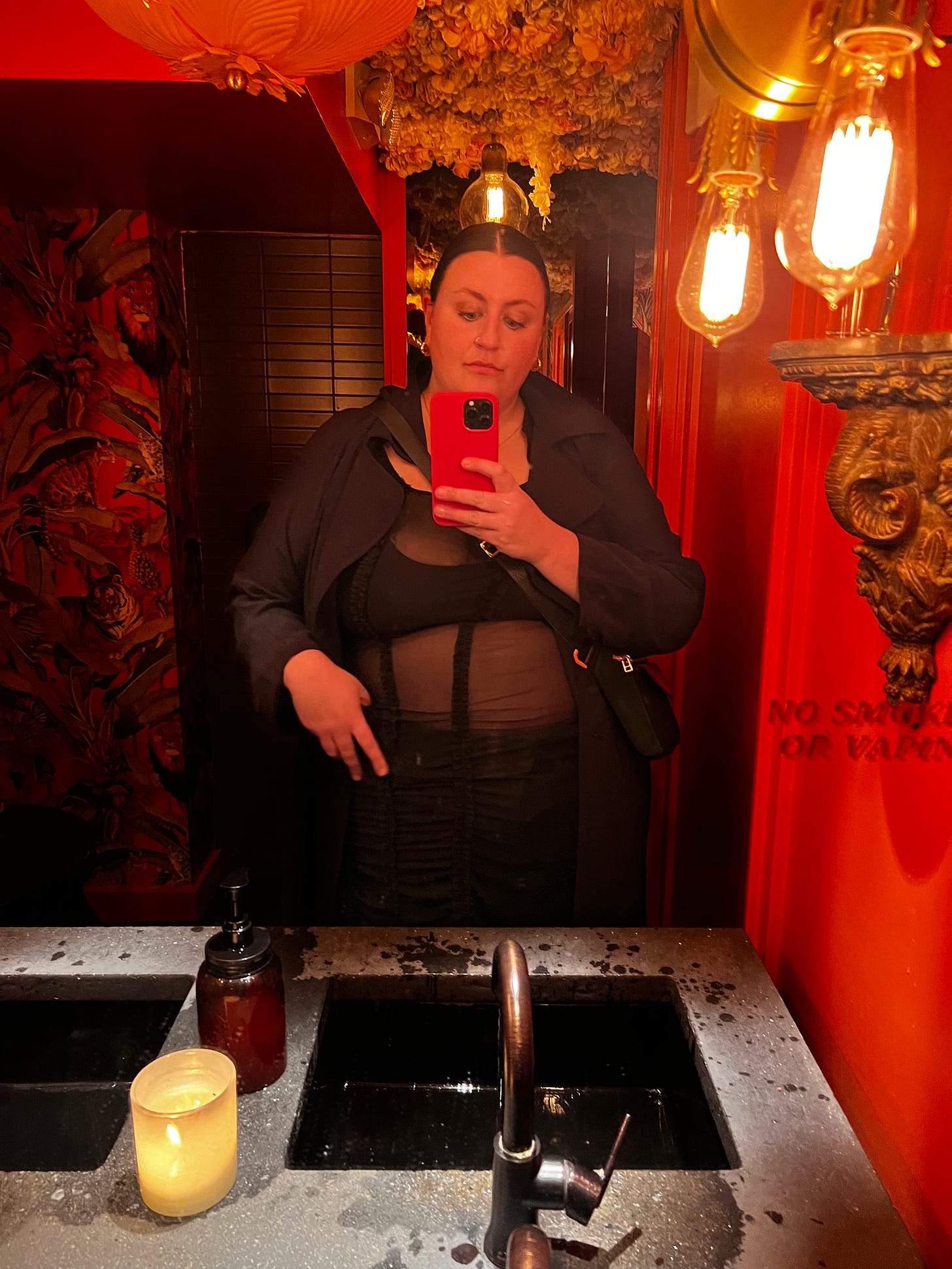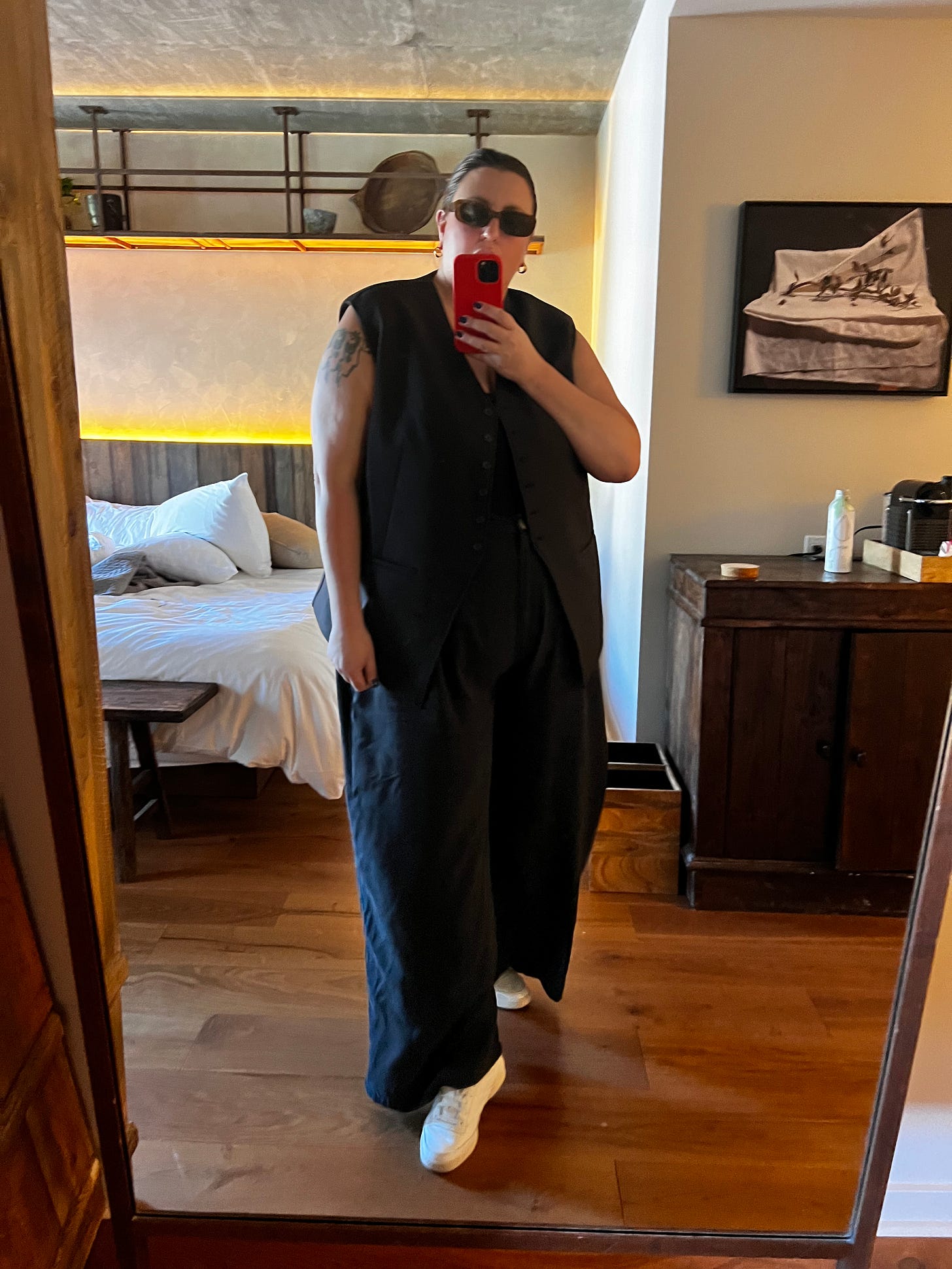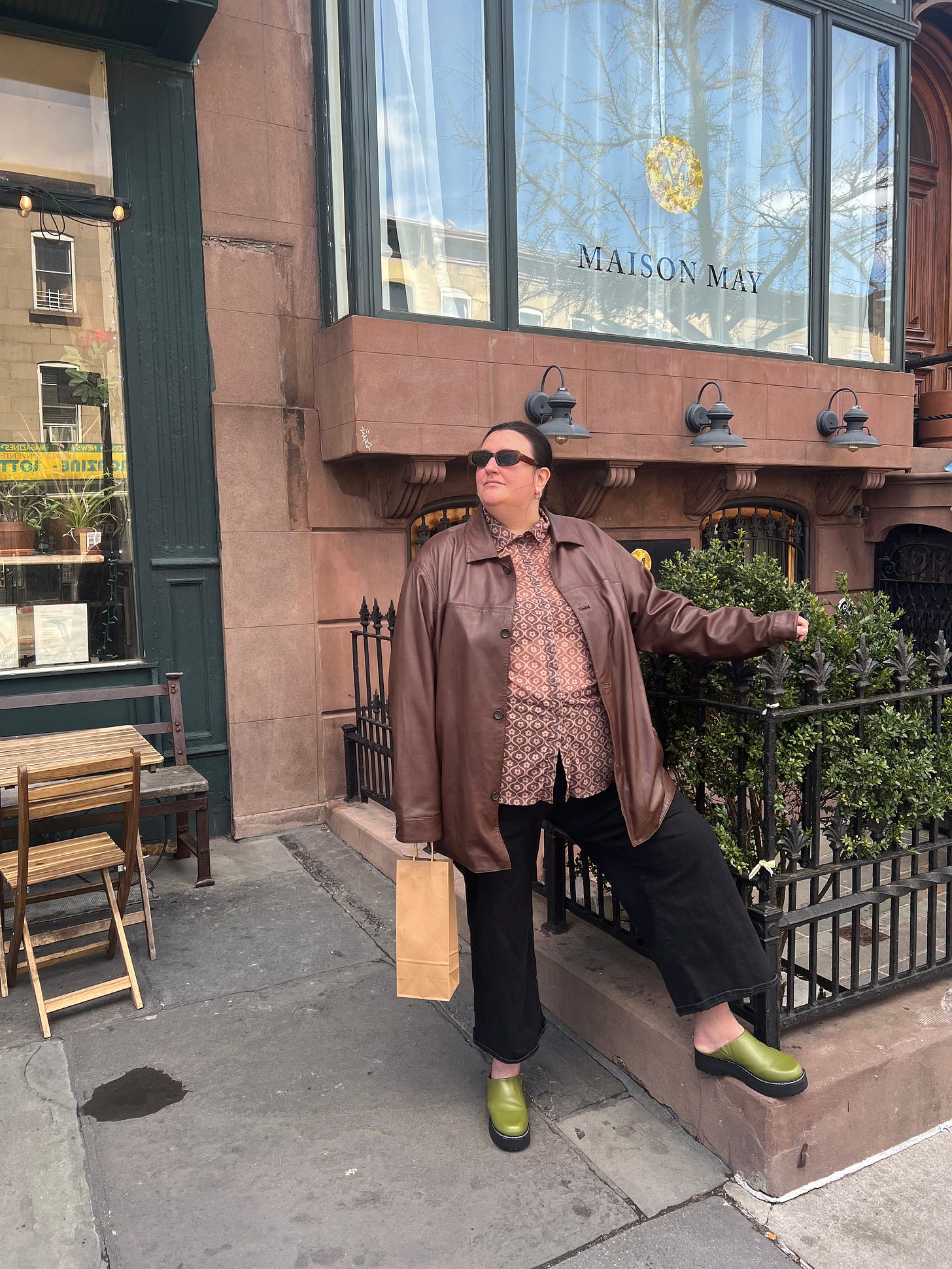I’m so happy to have writer on style stories this week. Amanda writes about a range of topics from existing as a fat and gay person to mental health in publications like InStyle and Teen Vogue. She’s been a prominent voice in calling out the fashion industry’s anti-fatness. I’ve always loved her work because she often writes about the frustration of being a fashion lover in a world where she’s had to settle for second best because of her body.
Q: Introduce yourself, your work, and how you spend your time.
My name is Amanda Richards. I grew up in Cleveland, Ohio, and spent the majority of my 20s living in Seoul, South Korea. I moved to Brooklyn, New York when I was 29, and have been living and working here ever since. I’ve had so many jobs in the near-decade I’ve been here — fashion journalist, editor, content strategist, that one time someone paid me to test a sex toy — but at my core, I’m a writer. I write about clothes, and bodies in and out of clothes, and my personal feelings about the experience of getting dressed, and occasionally about being gay and coming out at age 33. I’ve got bylines all over the place, but most recently my writing exists in my newsletter, fat hell.
Q: What was your style like when you were a child?
I imagine that most former fat kids will understand what I’m about to say: When I was a kid, I dressed like a tiny paralegal. I was taller and fatter than basically everyone, and because of this my mom often had to source my clothing from the women’s department. That meant a lot of stirrup pant suit sets, sensible trousers, dresses that made it hard to decipher if I was a child or an elderly woman. It was what was available to me. Despite that, I always loved to pull a look — even before I realized it, getting dressed was something I took seriously.
Q: Growing up, what messages were you given about what you should or shouldn’t wear (and from whom or where do you think those messages came)?
I heard all the classic messaging that young women hear (though thankfully not from my mother or anyone in my family, they blessedly spared me from that kind of critique). From the age of probably 5 to 25, I assumed I should dress to hide every “bad” part of myself — for me, that meant my stomach, which was always nice and round and therefore the bane of my existence. I spent a long time dressing to conceal that part of my body, and the thought of anyone perceiving it would send me into a tailspin. This resulted in a lot of oversized T-shirts (casual), empire waists (formal) and a backpack or purse draped precariously across my lap to hide what I thought was the problem (survival).
Q: How has your style evolved since you were younger and what phases have you gone through with your style (i.e. high school grunge phase, early working days business casual phase, etc)?
I have the distinct pleasure of being both a fat kid, and also a former closeted gay. That meant that not only did I go through a series of really specific style phases, but I felt incredibly awkward in literally every one of them. Some hits include the years I spent dressing exclusively in thrift store tees and cardigans, the era where I felt like I had to belt LITERALLY EVERYTHING, lest people not know I had a waist in there somewhere, the time after college I spent interviewing for jobs in horrid business casual separates and kitten heels because I thought it would make me look grown up, to the time around when I came out as a lesbian where I thought I had to always be wearing a denim jacket of some kind. Sometimes when I look at old pictures of myself it’s hard to believe that each separate phase of dressing was being selected by the same person — but ultimately, the clothing was changing and evolving and iterating right alongside my sense of self.
Q: How have external pressures to conform to the ideal standard of beauty and the thought of how others view you affected your style?
I think people assume that when you’re fat and ok with it, or fat and stylish, you’ve somehow figured out how to transcend those external pressures and are forever unencumbered by other people’s expectations. It’s really not true, though. I think now, instead of that former pressure to look thin, I’m more focused on looking the best that I can as a fat person, sometimes so much that I get into my own head about a very decent outfit being “good” enough. It’s like this made-up idea that I have if I’m going to be a fat, fashionable person, I have to look my absolute best at all times and can’t phone it in. But sometimes, you have to put on jeans a T-shirt and just let yourself fucking exist.
Q: How have your sense of style and shopping habits shifted along with changes in your body?
I still very much fight against the urge to over consume in a scarcity mindset. I’ve been plus size my entire life, and everyone knows those clothing options are far more limited. Sometimes, if I see something really cool, I don’t really stop to think if I need it, or even want it — I buy it because it’s there, and I know it will fit me. I’ve made it a goal to work on that more, but it’s definitely still there, especially because the plus-size fashion market plays so many games with my heart. Sometimes, I feel like I can find anything I want to buy — and then the next day, all I’ll see is tunics and peplums. It makes shopping feel sort of maddening.
Q: What barriers do you encounter in trying to express your style? Are there any situations or spaces you feel your style prohibits you from accessing or gives you better access to?
I’m incredibly privileged when it comes to accessing clothing. I typically wear a size 22/24, which means that most of the brands that offer plus sizes will offer something for me. Those options are still paltry compared to the straight size offerings, but seem abundant compared to larger plus sizes like 26 and above. I also have the income and lifestyle that allows me to spend money on clothing (almost) any time I want to. In the years since I came out, though, I have thought a lot more about my gender expression, femininity, and the body types that are “allowed” to wear certain types of clothing. Meeting my girlfriend a few years ago has also brought those ideas to the forefront — she’s fat too, but her gender presentation is more masculine, and the idea of what sorts of aesthetic spaces fat people (even fat gay people) are expected to play in with relationship to their gender is something that comes up a lot.
Q: Do you have any style icons? Who are they?
My answer to this used to always be no, but I’ve realized it’s just because I didn’t know myself well enough to have much of an opinion. Today, I’d say Emma D’Arcy (their looks on the House of the Dragon press tour has been everything to me), Remi Wolf (everything she wears is iconic and her new album comes out July 12),
(one of the OG fat fashion influencers who brings a smile to my face literally every time she posts), and that recent photo of Paul Mescal where he’s wearing little shorts and loafers.Q: How would you define your current relationship to clothes and style?
Like most people, I lost a bit of my fashion footing during the Covid years. I gained some weight, got depressed (unrelated to the weight gain, let me be clear), I hated the thought of putting effort into dressing. These days I’m finding a lot of joy in it again, and sort of rediscovering my sense of style alongside my sense of being in relationship with the world in a new way. Not to be dramatic.
Q: What makes your style authentic to who you are today?
Lately I’ve been letting myself get dressed according to who I want to be that day — not so much thinking about the idea of who I am supposed to be. This especially applies to how I’m playing with gender expression in my clothes. So what if I wore a ball gown and a full face of makeup yesterday? Today I’m dressing like a twink summering in Italy and that’s final.
Q: Do you wear anything that’s conventionally considered unflattering?
I think most of my wardrobe would probably be considered unflattering. I’m a big person who loves big clothes.
Thank you so much, Amanda! I loved this interview. For some reason this phrase really hit me: "my stomach was always nice and round". Just such a cozy and loving way to speak about a part of your body. And this: "the era where I felt like I had to belt LITERALLY EVERYTHING".
Make sure you’re following Amanda at fat hell!
Paid subscribers, read on for Amanda’s wardrobe recommendations!
P.S. I’ll be taking a vacation from Substack from 8/5-8/26 for travel, rest, and the back to school insanity. I’ll return with a post on 8/27! Feel free to pause your subscription during this time, or let it run if you’d like to subsidize my caretaking and rest. I’m opening the archives (typically a paid subscriber perk) for your reading pleasure, please enjoy!


